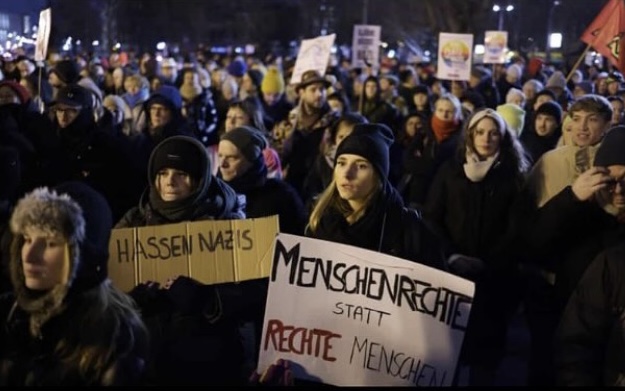Last weekend, hundreds of thousands of Germans took their voice to the streets to demonstrate against the policies of the far-right German political party Alternative for Germany (AfD). These demonstrations will be held in Dortmund and 90 other cities. German police report that in 2022, 364 reports of Islamophobic crimes were made. The number of crimes is not specific, because not all victims dare to report this to authorities. AfD is suspected of, among other things, stirring up xenophobia and Islamophobia.
Muslims experience significantly more discrimination than non-believers and Christians in all areas. Islamophobia is something that exists in many places in society and manifests itself in various social and political situations. By paying more attention to this problem, people are becoming more aware that Islamophobia is also a threat to society. “Muslim hatred often goes unreported due to a combination of fear of repercussions, lack of confidence in reporting authorities and the fear that the problem will not be taken seriously by society,” says Hanneke Felten, researcher from the Dutch organization Kennisplatform Inclusief Samenleven.
The growing popularity of the radical political party AfD is one of the factors behind increasing Islamophobia in Germany. Despite this, the party has greater popularity, mainly in East Germany. According to the organization European Islamophobia Report (EIR), 2022 has been declared a disaster year for the Muslim community worldwide. The organization has shed light on the increasing number of Islamophobia in European countries, emphasizing the significance of recognizing Islamophobia as a problem. In 2022, there was a growth in attacks on mosques in Germany. Last year, 26 mosques were attacked and in the year before there were ten cases. “The growth of the AfD could pose an obstacle to reducing Islamophobia. The negative expressions of Islamophobia are mainly manifested in insults on the street and difficulties in finding work or renting a home. German Muslims experience growing hostility and the feeling of social alienation,” says Hanneke. All these negative factors can have an effect on an individual’s mental health, but at the same time cohesion within the Muslim community is put under pressure. “On a political level, the “Islamophobia is reflected in policies that limit the religious freedom and cultural integration of Muslims. Debates over the headscarf ban, restrictions on the construction of mosques and tightened immigration laws have direct consequences for the freedom and equality of German Muslims,” said Ahmad Aweimer, spokesperson for the Council of Muslim communities in Dortmund.

Geographic tensions
Tensions in the Middle East are one of the causes that have led to a resurgence of hatred against Muslims in Europe. The problem has become very tangible in Germany over the past decade. “The Muslim hatred incidents are often underexposed in the media. “It is actually good to recognize this problem so that prejudices and fear will disappear”, says Hanneke. The Dutch platform Kennisplatform Inclusief Samenleven has examined three countries to gain more insight into Islamophobia outside the Netherlands. Germany was one of the countries included in this study. The country is the second country with the largest number of Muslim inhabitants in Europe with over 5 million Muslim residents.
In addition to tensions in the Middle East, the 9/11 terrorist attack has given a distorted image to Muslims worldwide. The research by the Authoritarismus Studies shows in 2022 that just over 70 percent of Germans agree that there should be a ban on the immigration of Muslims to Germany and approximately 80 percent feel alienated by the presence of Muslims. Muslim violence has increased after the 9/11 terrorist attack. According to the German research platform, The Independent Group of Experts on Muslim Hostility (UEM), the Muslim community is one of the most pressured minorities in Germany and faces more exclusion, prejudice and sometimes physical attacks every year. Women in particular are hit the hardest, because they show their religious identity most openly, such as by wearing a headscarf. Due to the growing violence the country has experienced, Germany has taken measures to treat violence against Muslims separately from the regular criminal violations since 2017.
One of the geopolitical tensions affecting the German people is Israel’s attack on Gaza. “The war is terrible, but I feel like there has been more awareness and solidarity for the Muslim community. The geographical tensions of Gaza have led to greater involvement of German Muslims in social discussions, committed to peace and equality,” says Aweimer.

While Islamophobia continues to pose a challenge in society, experiences of discrimination and hostility have fueled efforts to build a society that values diversity, equality and mutual respect. “The path forward includes tackling the root causes of Islamophobia, challenging discriminatory policies and promoting a culture of understanding and acceptance within the German community,” Hanneke said.




